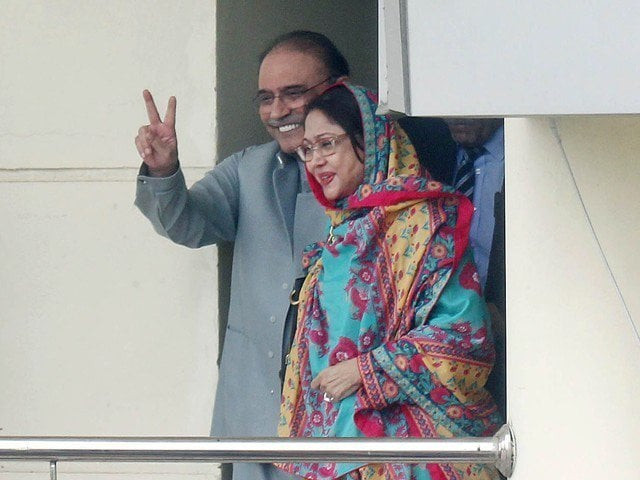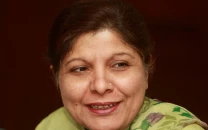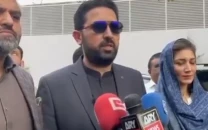Fake accounts case: Zardari, Talpur granted another bail extension
NAB prosecutor requests banking court to transfer case to Islamabad

Former president Asif Ali Zardari with his sister, Faryal Talpur. PHOTO: EXPRESS
Pakistan Peoples Party (PPP) top leadership, the Omni Group’s Anwar Majeed and his son Abdul Ghani Majeed, former Pakistan Stock Exchange chairperson Hussain Lawai, Summit Bank Senior Vice-President Taha Raza are among those being investigated in the case. The matter is also being heard by the Supreme Court.
Money laundering case: Zardari, Talpur get 7th bail extension
Zardari and Talpur arrived at the hearing under stringent security, while the incarcerated suspects Anwar Majeed, Abdul Ghani, Lawai and Raza were brought in by police.
During the hearing, the Federal Investigation Agency (FIA) submitted a medical report citing reasons for its failure to present main accused Aslam Masood, who was recently apprehended with the help of Interpol.
Meanwhile, the National Accountability Bureau’s prosecutor maintained that the case should be transferred to Islamabad and said the move was approved by NAB chairman Justice (retd) Javed Iqbal.
He also requested the court to dismiss the bail extension pleas.
The FIA prosecutor seconded his stance, arguing that the Supreme Court's directives in the suo motu case do not leave room for bail.
Prepared to face court trials: Zardari
Advocate Farook H Naek, Zardari’s counsel, pointed out that the apex court had ordered the JIT report to be forwarded to the anti-graft watchdog in Islamabad for future corruption references.
“The order did not mention the case pending in the banking court,” he said and accused the FIA of misconstruing SC order.
The court told FIA to submit documents if there had been any new developments in the case.
The banking court adjourned the hearing of Anwar Majeed and Abdul Ghani’s bail pleas till February 20 and granted extension in pre-arrest bail to Zardari, Talpur and five others till March 5.
Fake accounts case: Omni Group rejects JIT allegations
The fake accounts saga
In December 2015, the Federal Investigation Agency began a discreet investigation into certain bank accounts through which multi-billion rupee transactions have been made. According to FIA sources, information regarding the fake accounts came to the fore when an intelligence agency picked up a prominent money changer in an unrelated case.
As the monitoring and investigation of these suspicious accounts continued, it surfaced that five of these accounts in two banks – the Sindh Bank and Summit Bank – had been used for transactions worth around Rs15 billion.
Investigation showed the accounts were operated by fake companies. Funds were credited into these accounts from contractors with multi-billion rupee contracts with the Sindh government. The money was found to have been transferred to accounts of companies owned and operated by the Omni Group, whose chairperson, Anwar Majeed, is a close aide of Pakistan Peoples Party (PPP) co-chairperson Asif Ali Zardari. Another beneficiary was Nasir Lootah, the chairperson of Summit Bank.
The probe, however, was shelved. It resumed almost a year and a half later. FIA’s State Bank circle initiated a formal inquiry in January, 2018.
By June, the FIA had several high-profile names on its list but was unable to make headway – for several reasons. It was at his point that the Supreme Court intervened. Chief Justice Mian Saqib Nisar took suo motu notice of the ‘slow progress’ in the money laundering case.
In July, Zardari’s close aides; Hussain Lawai, Taha Raza and two others were arrested. Subsequently, the first case was registered in the mega-corruption scandal.
The FIA submitted its report to the apex court on July 8 which revealed a web of companies and accounts that were being used to transfer billions of rupees.
In all, 29 accounts were identified that received payments, totaling at least Rs35 billion.
In August, Omni Group chief Anwar Majeed was arrested along with son Abdul Ghani Majeed when they returned to the country on being summoned by the apex court. They are now on judicial remand.
Meanwhile, Asif Ali Zardari and Faryal Talpur have appeared before the investigators and have since secured interim bail from the Banking Court. The last hearing of the case was on December 21, when the duo got their fourth extension in the bail till January 7.
Amid complaints from the FIA and barbs flying in the Supreme Court, CJP Nisar ordered the formation of a Joint Investigation Team to quicken the pace of the investigation. One of FIA’s principal complaints was the lack of cooperation from the Sindh government.
Top court orders Bilawal, Shah’s names off ECL
The JIT report in a nutshell
According to the report, the JIT identified 11,500 bank accounts and 924 account holders at the start of their investigation.
Its experts generated 59 Suspected Transaction Reports (STR) and 24,500 Cash Transaction Reports. That means the transactions were flagged as suspicious.
Due to the high quantum of transactions, the JIT decided on a threshold of Rs10million “to track, follow and minutely investigate the flow of funds beyond the immediate counterparties and determine the source of funds and ultimate beneficiaries.”
It questioned 767 individuals, including Zardari and Talpur, while Bilawal submitted written responses.
It has since had the names of 147 individuals placed on the Provisional National Identification List, which would allow authorities to identify if those individuals try to enter or exit the country through an airport. After the report was submitted to the SC, the names of 172 individuals have been placed on the no-fly list by the interior ministry on the JIT’s request.
The investigations have focused on 32 accounts of 11 fake entities. The first account, belonging to M/S Lucky Enterprises, opened in January 2010 and remained active till January 2017. It was used for 13,809 transactions.
Damning JIT report indicts Zardari, Omni groups
The investigation uncovered that the 11 sole proprietorship entities were registered in the names of low-level employees of the Omni Group, as well as random individuals including a deceased person. All the accounts were operated by Omni Group executives.
A thorough review of the JIT report shows that representatives of State Bank and Securities and Exchange Commission of Pakistan (SECP) played a vital role in the investigation and preparation of the final report and recommendations.
Read the full text of the JIT report here.



















COMMENTS
Comments are moderated and generally will be posted if they are on-topic and not abusive.
For more information, please see our Comments FAQ